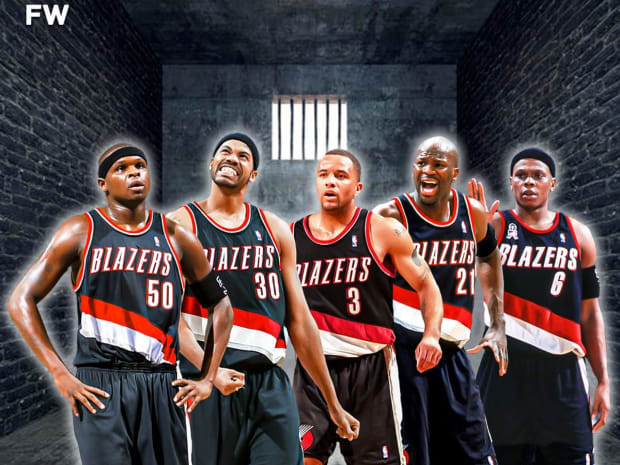The Jail Blazers: The Story Of The Portland Trail Blazers And Their Troublesome Players
The Portland Jail Blazers and their troublesome players of the early 2000s

View the original article to see embedded media.
The Portland Trail Blazers were a team that saw some modest success in their history. The squad won the title in 1977 and made it to the NBA Finals in 1990 and 1992.
In recent years, Damian Lillard has been the face of the team, constantly hitting clutch shot after clutch shot. The problem with the Lillard-led Trail Blazers is that they haven't had that much success in the playoffs. Despite this, the Trail Blazers are better off than they were in the early 2000s.
The Trail Blazers from the early 2000s were a very good team. In fact, they'd go on to challenge the powerhouse Los Angeles Lakers at the time, but they could never get back to the Finals.
The problem at that time wasn't on the court but instead off the court. Certain players on the squad kept finding themselves in trouble outside of the game. This reoccurring problem led to the team earning a not-so-glamorous nickname: The Jail Blazers.
The History Of The Jail Blazers
The start of the era in Portland basketball, known as “The Jail Blazers”, began in April 2001. Shawn Kemp, who was the high-flying slam dunk king from the 90s when he was a member of the Seattle SuperSonics, played for Portland in 2001. At this time in his career, Kemp was no longer a high-flying act.
On top of not being the same player he used to be on the court, Kemp was struggling with a demon off the court. Kemp's stardom quickly burned out as he was traded from the Sonics to the Cleveland Cavaliers. He became overweight, and he started to have a drug problem.
In April 2001, as a member of the Portland Trail Blazers, Kemp had a problem with cocaine, and he eventually left the team to check into a drug rehabilitation center. This was the start of a downward spiral that would affect the Trail Blazers team.
A little over a year after Kemp checked himself in rehab, in May 2002, Trail Blazers rookie, Zach Randolph, was cited for underage drinking. Later that year, in November, the Trail Blazers saw three more players get in trouble with the law.
Rasheed Wallace and Damon Stoudamire were driving home after a game in Seattle in November, and their car was stopped by the police. In the car was marijuana, and the two players agreed to attend drug counseling to have the charges against them dropped.
That same month, Ruben Patterson was arrested on felony domestic abuse charges against his wife. The news made headlines, bringing a negative image to the team. The charges were eventually dropped, but that didn't stop the media from speaking negatively about the team.
Later in March 2003, the Trail Blazers rookie, Qyntel Woods, was cited for speeding, driving without insurance, a driver's license, and marijuana possession. A month later, Randolph was back in the news after he punched Ruben Patterson in the face during practice.
The Jail Blazers kept bringing truth to their new name in July 2003, when Damon Stoudamire was arrested in Arizona at an airport. Marijuana was found in his possession as he tried to sneak it on the plane.
There was also an incident involving Rasheed Wallace in 2003, where he allegedly threatened referee Tim Donaghy and charged after him on the loading dock at the Rose Garden after the game. Wallace received a seven-game suspension for his actions.
Even with all the negative feedback, the Trail Blazers players were getting during this time; they didn't seem to care. The players kept getting into trouble, and the cycle appeared like it would go on forever.
The perfect example of this was when Trail Blazers guard, Bonzi Wells, had some choice words about the negative talk around his team. Wells said this in an interview:
“We're not going to worry about what the hell [the fans] think... they don't really matter to us. They can boo us every day, but they're still going to ask for our autographs if they see us on the street. That's why they're fans and we're NBA players.”
The players may not have cared, but this image was not good for the Trail Blazers, the city of Portland, and the NBA itself. The bad news was that Portland's problems seemed never-ending, and this was proven to be true, once again, by Qyntel Woods.
In the 2004-05 season, Woods pleaded guilty to misdemeanor animal abuse after it was discovered he was involved in dog fighting. As you are seeing, there's a theme to these Trail Blazers teams, and it's no wonder why they were dubbed the Jail Blazers.
The Trail Blazers' problems continued as two separate incidents occurred where a Trail Blazers player cussed out head coach Maurice Cheeks. First, Bonzi Wells verbally berated Coach Cheeks in 2003. Then, in 2005, Darius Miles took over and cursed out Coach Cheeks.
This period in Portland wasn't the best, especially when their success on the court faded away. The era of the Jail Blazers would eventually end when the troublemakers left the team.
Some of these troublemakers even found success later on in their careers. The perfect example of this is Rasheed Wallace, who'd go on to win an NBA championship in 2004 as a member of the Detroit Pistons.
Today, the Trail Blazers have a solid image, thanks to the loyal Damian Lillard, and the league as a whole has shut down the actions of wrongdoings by their players ever since the “Malice at the Palace” in 2004.
As for Trail Blazers fans, they are hoping their team will make it back to the NBA Finals and possibly win their first title since 1977. This, indeed, would be good for the Trail Blazers' image and the league.
Post a Comment
0 Comments